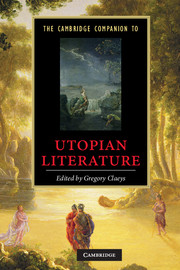Book contents
- Frontmatter
- Part I History
- 1 The concept of utopia
- 2 Thomas More’s Utopia: sources, legacy, and interpretation
- 3 Utopianism after More: the Renaissance and Enlightenment
- 4 Paradise transformed: varieties of nineteenth-century utopias
- 5 The origins of dystopia: Wells, Huxley and Orwell
- Part II Literature
- Further reading
- Index
2 - Thomas More’s Utopia: sources, legacy, and interpretation
from Part I - History
Published online by Cambridge University Press: 28 September 2010
- Frontmatter
- Part I History
- 1 The concept of utopia
- 2 Thomas More’s Utopia: sources, legacy, and interpretation
- 3 Utopianism after More: the Renaissance and Enlightenment
- 4 Paradise transformed: varieties of nineteenth-century utopias
- 5 The origins of dystopia: Wells, Huxley and Orwell
- Part II Literature
- Further reading
- Index
Summary
Towards the end of his discussion of the good life, happiness and unhappiness in Plato's Republic (591a-592b), Socrates stresses the importance of self-rule or self-discipline as a key to producing 'attunement and harmony' within each individual. To become involved in the vexed business, turmoil and conflict of governing flawed communities, might make such interior harmony or peace of mind unattainable. The good, having struggled to achieve attunement and harmony, should seriously consider jeopardizing it before entering the fray of politics in an imperfect world. Only in the ideal society which Socrates and Glaucon, earlier in their dialogue, had 'just been founding and describing' but 'which can't be accommodated anywhere in the world, and therefore rests at the level of ideas', might it be possible to be socially and politically active without corruption and self-destruction. Nevertheless, that ideal society 'is retained in heaven as a paradigm for those who desire to see it and through seeing it, to return from exile'. Whether it actually exists or not is of no matter, since it remains the only community in whose government the good and happy person could participate without ceasing to be good or happy. It remained their only true home; their return from exile. There are multiple tensions at work here. The dilemma of the good citizen confronting the disquieting, even corrupting, influence of politics in a dysfunctional world is paralleled by the choice between the inescapable turmoil of political participation and the possible 'attunement and harmony' of contemplative detachment.
- Type
- Chapter
- Information
- The Cambridge Companion to Utopian Literature , pp. 28 - 50Publisher: Cambridge University PressPrint publication year: 2010
- 6
- Cited by

